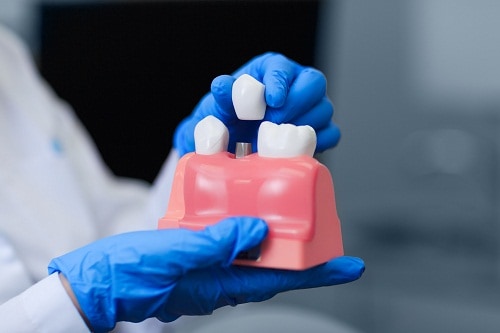Over the years, dental implants have become the preferred choice to replace missing teeth due to the safety and convenience they offer. Dental implants can be the smart choice for adults as well as adolescents once they are past this stage since facial growth and development would have ceased by then.
Dental implants offer several benefits as compared to similar conventional options like dentures and bridges. These are:
- They don’t feel ‘foreign’ within the mouth. Implants look, feel and even function like natural, healthy teeth.
- Since, they fit and function like natural teeth, they do not present any difficulty while eating or brushing.
- Healthy teeth surrounding the implant doesn’t require any additional treatment to act as supports.
- Dental implants do not require any adhesives to anchor the false teeth in place.
- Properly cared for implants can last for several years and need not be replaced as frequently as dental bridges and dentures.
- Dental implants protect facial bone and healthy teeth by stimulating bone growth and preventing bone loss.
Who should consider getting teeth implants?
Since dental implants are the preferred choice to replace missing teeth, anyone with missing teeth who would like to improve their appearance and chewing ability can consider getting dental implants. The only consideration is that the bone tissue is not growing or developing further (as is the case in children and adolescents). To ensure your mouth is healthy, your dentist may order a full oral examination to rule out any untreated tooth or gum disease. An untreated gum disease could result in an infection developing around the implant leading to the implant not functioning properly. The long-term success of implants depends on good oral hygiene habits that would give you healthy gums and sufficient bone to support the implant.
Types of implants
There are two types of implants considered safe to be used in adults.
- Endosteal implants:are surgically inserted directly into the jaw bone. A subsequent surgery is required to attach a post to the original implant. After this, artificial teeth are attached to the post either individually or grouped together on a bridge or denture.
- Subperiosteal implants:a metal frame is fixed onto the jawbone just beneath the gum tissue. After the gums heal, posts are connected to the frame and, as with endosteal implants, artificial teeth are attached to the posts.
At Killiney Dental, our team of experienced dentists specializes in dental implants. If you are considering getting dental implants, please get in touch with us today.
Author: Dr Gerald O’Connor BDS NUI (hons)
Dr Gerald O’Connor is the principal dentist and owner of Killiney Dental. Dr O’Connor graduated with an honours dental degree from University College Cork in 1998. He has since worked as a general dental surgeon in the UK and Ireland and has over 20 years experience in the dental field, with a particular interest in cosmetic and restorative dentistry. Dr O’Connor is an active member of the Irish Dental Association, sitting on its Quality Patient Safety Committee, and is a Irish Dental Council registered dentist.


